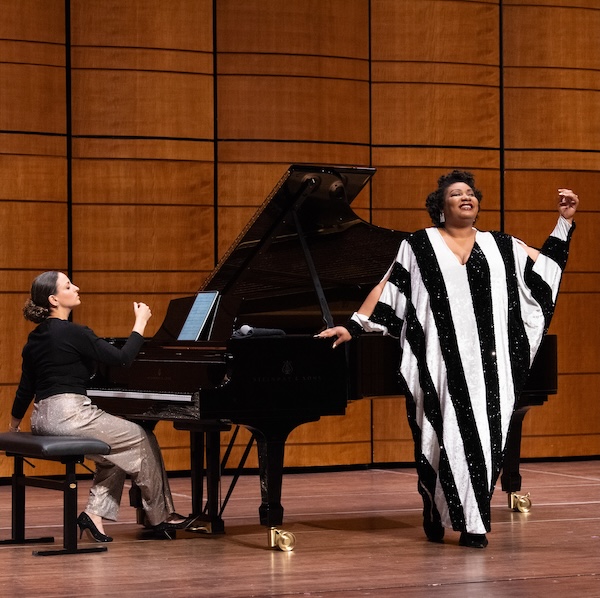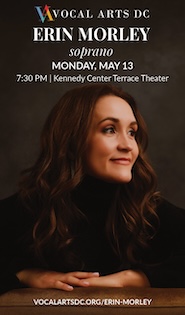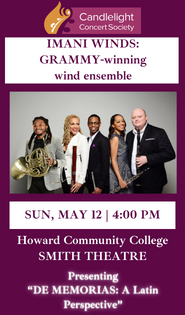Mezzo Bryce-Davis makes a refulgent debut with Vocal Arts

Raehann Bryce-Davis performed a recital with pianist Jeanne-Minette Cilliers for Vocal Arts DC Wednesday night at the Kennedy Center Terrace Theater. Photo: VADC
Raehann Bryce-Davis has erupted onto many prominent opera house stages in recent years, including Opera Philadelphia, Santa Fe Opera, the Metropolitan Opera, and Washington National Opera. The mezzo-soprano brought the same exuberance to the more reserved medium of the song recital Wednesday night, making her Vocal Arts DC debut at the Kennedy Center Terrace Theater.
Kudos for strong programming first: a slate of non-chestnuts stretched her dynamic voice, revealing its potency in range and volume. In Amy Beach’s rarely performed Three Browning Songs, her effervescent top notes shimmered, especially in the fast first song, “The Year’s at the Spring,” and with a blazing high G at the end of the third song, “I Send My Heart.” The second song, “Ah, Love, but a Day,” needed greater clarity of diction, but it also flattered her coffee-rich low range.
The high point of the evening came in the Wesendonck-Lieder of Richard Wagner. (Bryce-Davis just sang her first Fricka in Das Rheingold with the Los Angeles Philharmonic.) Wagner specified the vocal range for these five songs only as “a woman’s voice,” but Bryce-Davis had more than enough power at the top to sing what is in many ways a sketch for the soprano role of Isolde. Her partner, pianist Jeanne-Minette Cilliers, supported those forays upward and downward with sensitivity.
Both musicians created the sense of turbulence needed for the second song, “Stehe still,” but the tension of the third song, “Im Treibhaus,” most impressed, as the poet likened her life to the stifled oppression of plants in a hot greenhouse. Wagner later reused much of this song’s music in the opening of Act III in Tristan und Isolde, where the music evokes the suffering of the wounded Tristan, as he waits for Isolde before dying.
Cilliers proved equally engaging in her accompaniment of these slow-burning songs, especially in the final piece, “Träume.” Wagner’s extended introduction and postlude for the piano, marked by longing explorations of chromatic harmony and poignant appoggiaturas, seem to show the composer searching for the so-called Tristan chord. With a combination of the soft-pedal and a warm touch at the piano, Cilliers mined her part for all of its otherworldly dreaminess.
The recital’s second half seemed more personal, with many songs crafted especially for Bryce-Davis’s voice. Composer Melissa Dunphy worked with Bryce-Davis to adapt a poem by Walt Whitman into the text for her song “Come, My Tan-Faced Children.” The singer gave the text—morphed into a call to fight for racial justice—a relentless energy, culminating in a blazing high A at the fiery conclusion.
Two miniatures by older African-American composers nodded to the past. The high notes in “Birth” by Margaret Bonds, requiring softer control vocally at the top of the range, revealed the one weakness in Bryce-Davis’s arsenal. “The Crescent Moon” by Florence Price was even shorter, a pleasing but fleeting glimpse of the mysteries of night.
Of three songs by Maria Thompson Corley, set to her own direct poetry, “I Am Not an Angry Black Woman” made the deepest impression. Opening with a howl that rose from the depths, Bryce-Davis hammered home the point of the text, not to reduce black women to stereotypes but to see the relentless pain that afflicts them (“I am a live butterfly impaled on a pin”). Cilliers reinforced this anguish with searing glissandi and driving ostinatos in the left hand.
The other two Corley songs weakened in impact through a tendency toward repetition, both textual and musical, that became tiresome. Bryce-Davis softened and rounded her tone expressively in “The Beauty in My Blackness,” but in “Black Riders’ Freedom Song” she had a memory lapse at one point. Cilliers, in a stage whisper, got her singer back on track, but this only added to the sense that the song, heard in its world premiere, could use some tightening.
Selections from Peter Ashbourne’s Fi Mi Love Have Lion Heart, settings of Jamaican folk songs, rounded out the evening with some warm nostalgia. Bryce Davis, who spoke of her Jamaican mother singing such tunes around the house when she was a child, sang the first two songs, “Banyan Tree” and the title song, with lush warmth. At the keyboard, Cilliers made the most of the dissonant modern twists in Ashbourne’s accompaniment. Singers looking for a sparkling encore should check out the fast, playful “Nobody’s Business,” set to a bristling patois text.
For her encore, Bryce-Harris delivered a heart-felt, full-voiced rendition of the spiritual “I Don’t Feel Noways Tired” (in Jacqueline Hairston’s arrangement). The thoughtful pacing of this piece, up to an ecstatic B-flat, proved earnest and emotionally powerful.
Tenor Russell Thomas and pianist Lucas Nogara perform songs by Beethoven, Duparc, Barber, and Strauss, plus a new cycle by Jasmine Barnes, 7:30 p.m. February 14. vocalartsdc.org



